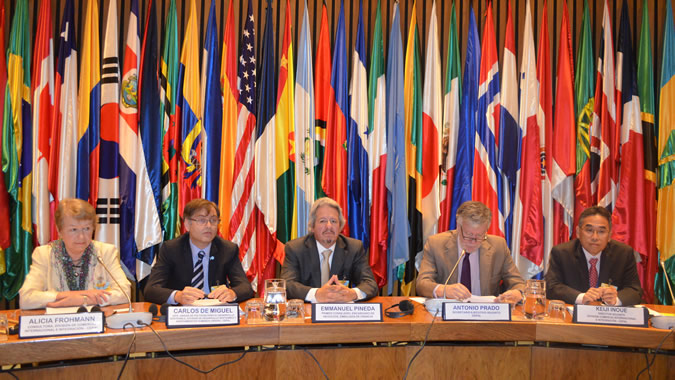Briefing note
Experts from 15 Latin American, the Caribbean and European countries meet at the Economic Commission for Latin America and the Caribbean (ECLAC) headquarters in Santiago, Chile to analyze the contribution of international trade to fight climate change in the region, just two days after the end of the negotiations at the 21 Conference of the Parties (COP) of the United Nations Framework Convention on Climate Change held in Paris.
At the VII International ECLAC Environmental Footprint Seminar: Environmental Standards in the International Trade, organized by this United Nations regional commission with the support of the French cooperation, participants will review the environmental standards applied to trade and measures on how the region can progress in the reduction of its export’s environmental footprint and the adoption of instruments that effectively promote a transition towards a low carbon economy.
The seventh version of the meeting was inaugurated on Monday, December 14, 2015 by Antonio Prado, ECLAC’s Deputy Executive Secretary, who underscored the great progress implied by the COP 21 and the 2030 Agenda for Sustainable Development, approved in September by the UN member states.
“The fight against climate change is one of the central challenges humanity faces today. It is a tectonics change that countries should consider in future strategies, considering that it represents a threat to food security and sustainable development in general,” Prado said.
The senior United Nations official recalled that Latin America and the Caribbean are not indifferent to the effects of climate change and are already suffering the consequences of extreme events such as floods, droughts and rise of the sea level. He emphasized the need to quickly advance towards economic low carbon models, which includes improving the measurement of emissions and environmental footprint stemming from international trade.
Experts from ECLAC’s Divisions of International Trade and Integration and Sustainable Development and Human Settlements agreed that the challenges posed by climate change are of such magnitude that they force a shift in the current production and consumption patterns in the region, in order to definitely advance towards a more sustainable development. That is why studying the interrelations between climate change, international trade and sustainable development are particularly relevant in the current global situation.
Regarding the results of the COP 21, the specialists said that although they are positive considering that most countries of the world committed to make national contributions for reducing the emission of greenhouse gases, there are still several pending challenges.
The main challenge refers to the imposed goal of keeping the planet’s warming below 2 degrees in the coming years, since the national contributions pledged by the countries currently add to 2.7 degrees. “Therefore, an even greater effort is required,” the experts said.
On behalf of the Embassy of France in Chile, the First Adviser and Chargé d’Affaires, Emmanuel Pineda, mentioned that the commitment reached at the COP 21 is a successful agreement of a universal character, ambitious, balanced, legally binding and dynamic, given that it foresees periodic reviews of the national goals every five years. In addition, he emphasized that it marks great progress in the process of raising awareness in society to move towards more resilient and low carbon economies.



